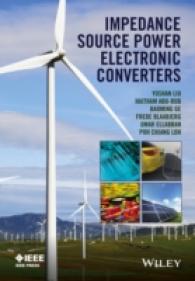- ホーム
- > 洋書
- > 英文書
- > Literary Criticism
Full Description
This edited book focuses on the role of scholars in studying their own individual traumas, exploring the complex interplay between personal trauma and scholarly engagement. It gathers a diverse range of contributions, including an essay, seven articles, and an insightful interview. The authors discuss the emotional, ethical, and intellectual challenges they faced in the research and representation of their traumas. They examine how personal and collective wounds shape individual identities, community narratives, and broader societal dynamics in Europe, Asia, Australia, and the Americas from the 1930s to the present. The causes of trauma are multifaceted and include the current war in the Middle East, school shootings in the USA, the AIDS crisis in South Africa, genocides such as the Holodomor and the Holocaust, nuclear warfare during the Second World War, and childhood abuse. Following the diverse methodologies employed in trauma studies, this volume reflects multidisciplinary backgrounds and will be beneficial for students, scholars, and researchers of literature, film studies, history, psychology, musicology, and visual art.
The chapters in this book were originally published as a special issue of Life Writing.
Contents
Introduction: Wounded Scholar, Healing Witness 1. 'I Hope You and Your Loved Ones Remain Safe': Dispatch from a Teacher-Scholar-Life Writer in Wartime 2. Kinship in Darkness: On the Humanities' Intrinsic Potential to Foster Post-Traumatic Healing 3. On the Memory of Birds: A Meditation on Memory and Mourning AIDS Deaths in South Africa 4. Inventing Reality: An Integration of Autobiographical Fiction with Jungian Psychoanalysis to Negotiate a Personal Experience of Trauma 5. Between the Personal and the History: Writing a Biography in the First Person 6. Trauma and Healing through Postgenerational Holodomor Survivor Research 7. Torn Bodies: Inner Conflicts of Surviving Composers 8. Scriptotherapy: WW2 Shanghai Female Refugees' Memoirs 9. On Witnessing, the Responsibility of Transmitting, and the Healing Powers of Creativity. An Interview with the Jewish-Argentine Artist Mirta Kupferminc








